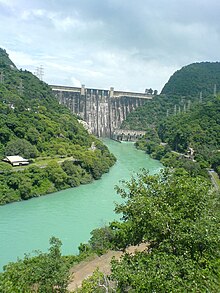Bhakra Nangal Dam
| Bhakra Dam | |
|---|---|

The Bhakra Dam
|
|
|
Bhakra Dam in Bilaspur, Himachal Pradesh
|
|
| Official name | Bhakra Dam |
| Location | Bilaspur, Himachal Pradesh, India |
| Coordinates | 31°24′39″N 76°26′0″E / 31.41083°N 76.43333°ECoordinates: 31°24′39″N 76°26′0″E / 31.41083°N 76.43333°E |
| Construction began | 1948 |
| Opening date | 1963 |
| Construction cost | ₹245.28 crore in 1963 |
| Dam and spillways | |
| Type of dam | Concrete gravity |
| Impounds | Satluj River |
| Height | 741 ft (226 m) |
| Length | 1,700 ft (520 m) |
| Width (crest) | 30 ft (9.1 m) |
| Width (base) | 625 ft (191 m) |
| Spillway type | Controlled, overflow |
| Reservoir | |
| Creates | Gobindsagar Reservoir |
| Total capacity | 9.340 km3 |
| Surface area | 168.35 km2 |
| Power Station | |
| Commission date | 1960-1968 |
| Turbines | 5 x 108 MW, 5 x 157 MW Francis-type |
| Installed capacity | 1325 MW |
| Bhakra Dam bridge | |
|---|---|
| Characteristics | |
| Total length | 1700 feet |
| Width | 30 feet |
Bhakra Dam is a concrete gravity dam on the Sutlej River in Bilaspur, Himachal Pradesh in northern India. The dam forms the Gobind Sagar reservoir.
The dam, located at a gorge near the (now submerged) upstream Bhakra village in Bilaspur district of Himachal Pradesh of height 226 m. The length of the dam (measured from the road above it) is 518.25 m and the width is 9.1 m. Its reservoir known as "Gobind Sagar" stores up to 9.34 billion cubic metres of water. The 90 km long reservoir created by the Bhakra Dam is spread over an area of 168.35 km2. In terms of quantity of water, it is the third largest reservoir in India, the first being in Madhya Pradesh with capacity of 12.22 billion cu m and second Nagarjunasagar Dam.
Described as "New Temple of Resurgent India" by Jawaharlal Nehru, the first prime minister of India, the dam attracts tourists from all over India. Bhakra dam is 15 km from Nangal city and 20 km from Naina Devi town.
Nangal Dam is another dam downstream of Bhakra Dam. However, sometimes both the dams together are called Bhakra-Nangal Dam though they are two separate dams.
The Bhakra-Nangal multipurpose dams were among the earliest river valley development schemes undertaken by India after independence though the project had been conceived long before India became a free nation. The agreement for this project had been signed by the then Punjab Revenue Minister, Sir Chhotu Ram in November 1944 with Raja of Bilaspur and finalised the project plan on 8 January 1945. Preliminary works commenced in 1946. Construction of the dam started in 1948; Jawaharlal Nehru poured the first bucket of concrete into the dry riverbed of the Sutlej on 17 November 1955, as a symbolic initiation of the work. Addressing a gathering there, he said, "This is a gift to the people of India and to the future generations from the workers who built this dam", calling for "rais[ing] a memorial" at the dam "in honour" of the workers. The dam was completed by the end of 1963. Successive stages were completed by the early 1970s.
...
Wikipedia

